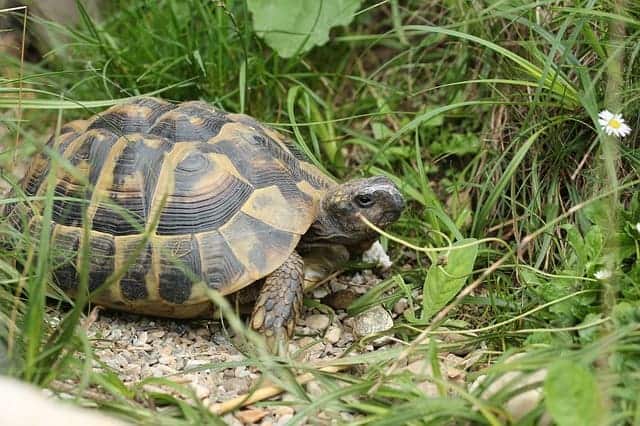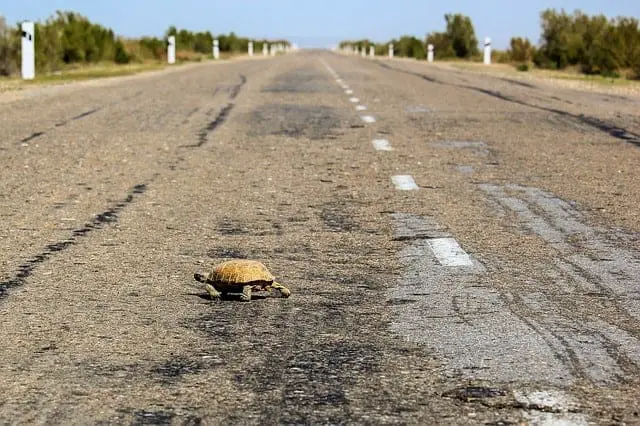
Deliberately releasing a captive bred, captive kept tortoise into the wild is almost universally a bad idea for several reasons:
- Unless the tortoise is native to the part of the world you live in, they are a completely alien form of fauna, which could spark all manner of problems either for them or the local ecosystem.
- A captive bred tortoise will have no concept of living in the wild an will not likely fare well when there are predators around, and in a residential area, cars and other man made threats.
- Tortoises need to have local knowledge of their environment (where to forage for food and water for example) which takes time to achieve, likely not enough time before they succumb to unforeseen threats
- If you live in a tropical part of the world and release a subtropical species into the wild they will face the added burden of being in a climate unsuited to their needs, in particular they won’t experience temperatures low enough for hibernation. Tropical species may also suffer in the inverse situation given that they are not adapted to cope with lower temperatures.
The only real exception whereby releasing a tortoise into the wild is when it has been extracted from the wild in the first place (whether legally or illegally). In this case it is prudent to return the tortoise to within a mile of the place it was originally extracted from.

Keep in mind that tortoises are wild animals by design, and therefore given the chance they will wander off into the wider world whether or not you intend them to do so. Just because as owners we play by the rules doesn’t mean they do, so if you are concerned about unintentionally losing your tortoise to nature then it’s worth having a read of this article on enclosure security.
When Would a Wild Tortoise Legitimately be Taken/Returned to The Wild?

There are few circumstances when a wild tortoise should be removed from its natural habitat, with possible exceptions being licenced individuals removing sick tortoises for rehabilitation.
These same individuals are then allowed to reintroduce such tortoises back into the wild, provided they have ensured the tortoise has not picked up any parasites foreign to their natural environment. It’s not hard to see that all this takes specialist skill and knowledge not available to the average person on the street.
I don’t believe there are any circumstances when the average person is permitted to remove a tortoise from the wild, indeed even disturbing a tortoise unnecessarily is punishable by a heavy fine in several US states. Even Gopher tortoises, as much of a nuisance as they can be to home owners in the south east of the country, cannot be removed.
The only possible exception that allows a member of the public to touch a wild tortoise is when the tortoise is in imminent danger and must be moved to safety. For example if you were driving down a road and a tortoise was in the middle of said road, you would be able to move them to safety away from the road.
What Should I do With my Tortoise if I Cannot Release it Into The Wild?
If for whatever reason you are unable to continue to care for your tortoise you should try to find a new home for them, although this isn’t as easy as it might at first seem, hence the temptation to release them into the wild instead. Again, don’t do this under any circumstances!
First of all ask around with family and friends to see if anyone you know would be willing to take on your tortoise, although if you do find a willing volunteer you must make sure they actually want a pet tortoise, and they aren’t just doing you a favour, or else it could just become a case of passing the buck rather than solving the problem!
You can try selling your tortoise, but you must check you have all the required documentation (if the breed requires documentation) otherwise it may be illegal to sell the tortoise. Again, don’t expect a huge amount of interest for your tortoise, there simply isn’t a huge demand for them. Check out this article for more information on selling and rehoming tortoises.
You could also try taking your tortoise to a sanctuary/tortoise charity, who may be able to help, but again depending on their capacity they may or may not have the room.
Not Certain You’ll be Able to Commit to a Tortoise?
In which case the simple answer is to not buy one! Tortoises are long lived animals, and in some cases they are more than a lifelong commitment for a single owner! It is therefore imperative to fully research exactly what tortoises are like, and what the requirements for keeping them are.
Check out this article for the reasons why you might want to think twice about getting a tortoise.



